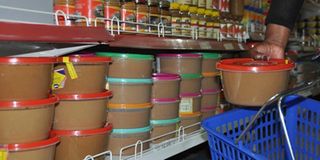Prime
Investing in groundnut paste pays

Groundnuts paste on display in a shop. Investing in paste production can be a very profitable business because it does not require a lot of money and expertise to begin, and it also consumes very little space in terms of storage. PHOTO BY ERONIE KAMUKAMA
What you need to know:
You probably already know that it’s quite easy to make groundnut paste. But if you have never actually made it yourself, you probably need to try it out if you must understand how easy it is; but also for the sole purpose of making money ‘easily’, Dorothy Nakaweesi writes.
Groundnut paste is made from grinding fried groundnuts into a sticky stuff called paste.
The paste is used as a sauce stew to accompany food. It is many times mixed with other sauce or mixed directly into food.
It makes soup heavy, and tastes nice. It may also be used or pasted on bread and be used instead of butter. It is normally a safe product, especially if stainless steel machinery is used in making it.
Anyone interested in this business at a large scale should look at processing more than 200 kilogrammes of groundnuts daily. And with an investment capital of $2,000 (about Shs7.2 million) involving raw materials, the packaging and machinery, one can go big on the project.
Ms Annet Ayamba, the managing director, Your Choice Agro Processors Ltd, who has been dealing in this business on small-scale shares that one can start with less than Shs1 million.
“You can use this money to buy about five bags of groundnuts each currently costing Shs130, 000. The rest can be used to buy packaging jars and for labelling,” she said.
After grinding, each bag should produce about 30 kilogrammes of processed product. And at Shs10, 000 a kilo, you can get Shs1,500,000 from the five bags. Her advice is that one needs to buy groundnuts that are not yet pounded to be sure of the quality.
Incentives
It is in the interest of government for anybody to take up any venture that would add value to agricultural produce where this project falls.
Mr John Musajjakawa, the Uganda Investment Authority senior investment officer, shares: “There are low interest financial facilities in different institutions that can be accessed by those that suit the prescribed investment lines or parameters.”
Production
The process begins with the cleaning and sorting of the sun-dried shelled groundnuts.
Thereafter, the nuts are fried briefly so that they can make a paste and to give a good taste.
It is then put into the grinding machine for processing into a paste and packed in plastic containers.
The process is quite simple and fast. A substantial amount of paste can be processed in a day with modest equipment within a small space.
Mr Deus Mubangizi, the manager of testing laboratories at the Uganda National Bureau of Standards (UNBS), advises that anyone with interest to do this business should comply with the required standards.
“Processing peanut is in the category of food which calls for one to check the gestation period, packaging, labelling and factory standards,” he said.
Market
The product has a ready market with outlets spread all over the country. The paste can be stocked in markets, small retail shops and large supermarkets throughout the year.




